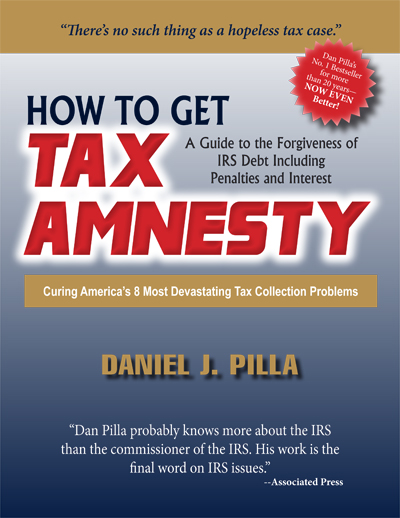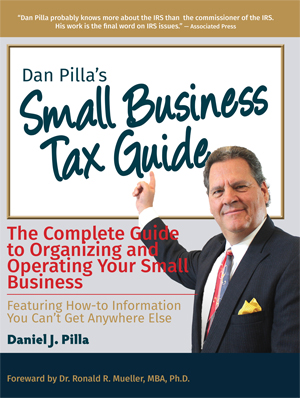Solving 29 of America’s Most Common IRS Problems
Part III – Penalties and Interest (Problems 6-9)
Each year, the IRS issues well over thirty million penalties against individuals and businesses. Revenue from these assessments is often in excess of $15 billion.
As a result, this is one of the largest sources of continuing frustration for citizens. Every year, the Taxpayer Advocate’s Annual Report to Congress places penalties high on the list of the twenty most serious problems faced by citizens. A survey by the IRS of tax professionals shows that professionals consider penalties to be the fifth most serious problem faced by citizens. Fortunately, there is a simple and highly effective method of dealing with penalties. Unfortunately, the IRS does not often tell the truth about the procedure.
To make matters worse, interest on a tax bill often doubles, triples–even more–the debt. And this is one area where the IRS flat lies about one’s right to deal with the problem. IRS publications declare that interest is always added and can never be canceled from a delinquent debt. While that is true in many cases, it is not a universal rule. There are several circumstances under which interest is legally subject to cancellation and like penalties, the procedure is quite simple.
Problem 6 The IRS issued a computer notice claiming I owe penalties.
Problem 7 The IRS added penalties to my previous bill.
Problem 8 The IRS added penalties to a bill determined from a tax audit.
Problem 9 The IRS assessed the trust fund recovery penalty.
Problem 10 The IRS unfairly added interest to my tax bill.
Problem 6 – THE IRS ISSUED A COMPUTER NOTICE CLAIMING I OWE PENALTIES.
CONSEQUENCE: You have to pay additional money in the form of the penalty and the interest on the penalty.
SOLUTION: Make a written request for abatement.
Read more
The tax code gives you the right to request cancellation of any IRS penalty. Nearly every one of the more than 140 penalty provisions of the code contains what is called a good faith exception. It means that if you acted in good faith and based upon a reasonable cause for your actions and not out of a deliberate attempt to cheat, deceive or mislead the IRS, the penalty does not apply. The procedure for seeking cancellation of penalties is remarkably simple. It does not even require a special form.
To make a request for cancellation of penalties, simply respond in writing to the IRS service center that issued the notice. Address your letter to the Penalty Abatement Coordinator and clearly identify it as a “penalty Abatement Request.” Then, in great detail, give the facts and circumstances of the case. Take care to set forth details allowing the reader to conclude that you acted in good faith and based upon a reasonable cause for your actions, and not out of a deliberate attempt to cheat. Be clear not vague. Give dates and names where appropriate.
To the extent possible, provide copies (not originals) of documents you rely upon to support your claim. For example, if you claim that an auto accident prevented the filing of your tax return on time, provide all the details of the accident, including hospital and physician reports, insurance claims, medical bills, etc., to buttress your request. Always send your correspondence to the IRS using certified mail with return receipt requested.
My book, The IRS Problem Solver Book, contains a chapter on the penalty cancellation process. In great detail, I walk you through the process of canceling the most common penalties, including the failure to file and failure to pay penalties which, combined, are assessed more than 15.5 million times annually. The book also walks you through the process of appealing an adverse decision on your penalty abatement request. Plus, my book Dan Pilla’s Small Business Tax Guide has detailed discussion of this topic as it relates to businesses.
Problem 7 – THE IRS ADDED PENALTIES TO MY PREVIOUS BILL.
CONSEQUENCE: An already high tax bill grows even higher.
SOLUTION: Ask for abatement of penalties.
Read more
At anytime during the collection process, penalties are subject to cancellation on the basis of good faith, reasonable cause. Even if your tax bill is many years old and the penalties date back those several years, they are subject to cancellation when you can demonstrate facts showing your good faith. Always make every attempt to cancel penalties, especially on those bills that are aged. Cancellation has a dramatic positive impact on cutting the bill.
If you have equity in a home or other real estate and can pay the tax using that equity, canceling the penalties can be your ticket out of tax trouble. They key is to make your application for penalty cancellation prior to paying the penalties. Once the IRS cancels the penalties, use the equity in your home to pay the remaining balance of tax.
Read more
Even if you owe the tax alleged in connection with an audit, the penalties must be excluded when you can prove good faith, reasonable cause. Before you sign off on any audit decision, review the report to see whether it includes penalties. If so, challenge the penalties by submitting a detailed abatement request to the auditor who conducted the examination. Make it clear that you will not accept any audit decision that includes improper penalties. Explain that you intend to exercise your right to appeal the audit decision if they are not removed. If necessary, the IRS’s Office of Appeals has the authority to review your challenge to the penalties.
Read more
The Trust Fund Recovery Penalty is used to collect unpaid business employment taxes from the owners or managers of a failed corporation. The law allows the IRS to assess the penalty against the company’s “responsible officers,” those who should have paid the tax but did not. However, in many cases, the IRS uses the shotgun approach, assessing the penalty against any corporate employee who had a hand in the company’s finances, whether or not they are legally considered “responsible officers.”
A responsible officer is the person within the company with the ultimate authority to dispose of company assets. He is the person (or persons) making the decisions as to which creditors get paid and which do not. If you do not have such authority, you cannot be the responsible officer, whether or not you may have signed company checks.
To challenge a Trust Fund Recovery Penalty assessment, write a protest letter explaining that you wish to challenge the assessment. Ask for a hearing before the IRS’s Appeals Office. This is the section of the IRS set up to hear appeals and which has the authority to overturn just about any IRS decision. Be prepared to submit details on what role you played in the company and who was in fact responsible for making the critical financial decisions that left the IRS unpaid. My book, Taxpayers Defense Manual, chapter six, provides the step-by-step details for making this appeal, drafting your arguments and presenting the case. IRS Publication 5 explains how to write a protest letter.
Problem 10 – THE IRS UNFAIRLY ADDED INTEREST TO MY TAX BILL.
CONSEQUENCE: With interest compounded daily, the tax debt is pushed higher each day.
SOLUTION: Ask for cancellation of the interest.
Read more
The IRS flatly denies that interest is subject to cancellation, but the law provides three clear situations in which it may be canceled. The first is where the interest is attributable to IRS delay that occurs while processing the case. The second is where the interest is attributable to an IRS error. And the third is where the interest is attributable to an erroneous refund issued by the IRS but which you in no way caused.
Request cancellation of interest much the same way you do penalties. Write a letter to the service center handling your account. Address your letter to the Interest Abatement Coordinator. Provide detailed facts to allow the reader to conclude that the interest is attributable to one of the three areas mentioned above. Document your claims every way possible. Be specific, not vague. Argue that you are entitled to have all or part of the interest canceled. Chapter seven of The IRS Problem Solver Book covers the interest abatement process in great detail, giving examples of letters use in each of the three instances in question.
Back to 29 Problems Packages Back to Top
Solutions – Book Packages
Package 1
IRS Abuse Prevention Package $59
Helps solve problems #1, 2, 8, 12, 14, 15, 16, 17, 18, 19
Includes:
– Small Business Tax Guide
– How to Win Your Tax Audit
Package 2
Tax Problem Resolution Package $75
3 Best Sellers
Helps to solve problems listed in package 1, plus: #1, 5, 6-8, 10-17, 19, 22-26, 28
Includes:
– How to Get Tax Amnesty
– The IRS Problem Solver
– How to Win Your Tax Audit
IRS Defense Library $249
Helps to solve problems listed in package 2, plus: #9, 18, 21, 27, 29
Includes:
– All of Dan’s Current Books
– One year of Pilla Talks Taxes
Dan’s electronic newsletter
Back to 29 Problems Packages Back to Top
Packages qualify for one free 15 minute phone consult with Dan…$75 value



